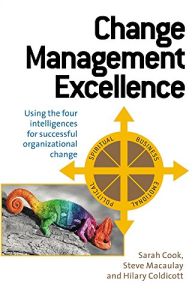Únase a getAbstract para acceder al resumen.

Únase a getAbstract para acceder al resumen.
Hilary Coldicott, Sarah Cook and Steve Macaulay
Change Management Excellence
Using The Four Intelligences For Successful Organizational Change
Kogan Page, 2004
¿De qué se trata?
You have to be smart in four ways to manage change. You need business, political, emotional and spiritual intelligence.
Recommendation
Authors Sarah Cook, Steve Macaulay and Hilary Coldicott offer a solid, reliable roadmap for navigating the twisted trails of corporate change initiatives. This comprehensive presentation is based on the authors’ combined 40 years of consulting and change-facilitation experience. The book provides a wealth of self-diagnostic tests, interactive exercises and checklists to help you tackle the practical mechanics of introducing organizational change from all four compass points: business, politics, emotions and the spirit. The volume demonstrates little patience with the self-serving "practical" case studies that are de rigueur in business books. While one might applaud the authors’ sense of economy in eliminating "how great we are" stories, their absence may also explain why the book comes across as just a tad dry. Change is a perpetually dynamic story line, so one expects its roadmap to bear a range of narrative hues, although the sound advice here is rare enough. getAbstract strongly recommends this volume - when you’re lost, any good map is your friend. It doesn’t have to be fancy as long as it includes a compass.
Summary
About the Authors
Sarah Cook is in charge of service excellence and leadership development consultants at The Stairway Consultancy. The author of Customer Care Excellence, she is an established facilitator and frequent public speaker on customer service and corporate culture. Steve Macaulay has broad experience in telecommunications and IT, where he headed several change management initiatives. He is Management Development Consultant at Cranfield School of Management. Hilary Coldicott is a consultant whose practice focuses on employee development and training.





















Comment on this summary